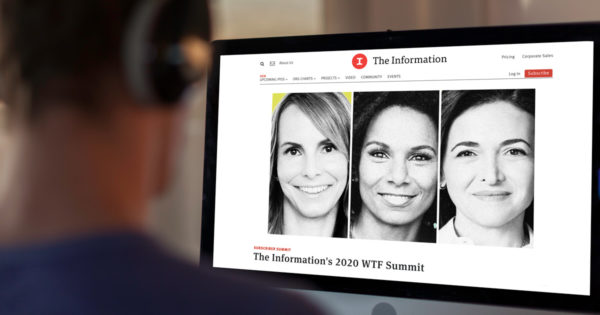
The Information is banking on virtual events as the media industry, along with the rest of the world, heads into a new season of the Covid-19 pandemic. And the tech-focused digital publisher is boasting early commercial success, so much so that no future event will be without a strong virtual component.
By year’s end, The Information will have hosted 50 virtual events and surpassed ticket goals for each of them, though it wouldn’t say what those goals were. The publisher is fresh off tests with two marquee events usually held in person: its Autonomous Vehicle Summit in June and WTF Summit in September.
“I was quite nervous about how they would translate, but they turned out to work incredibly well,” founder and editor in chief Jessica Lessin told Adweek. “And I think it gets back to who’s in the room and what are they saying. Our strength has always been our community.”
Therein lies the challenge most organizations face in converting their physical events businesses into virtual equivalents: recreating interactions with the community digitally. Before the pandemic, events were seen as a critical life source for media organizations. Publishers including The Wall Street Journal, The Atlantic and CNBC generated roughly $22 million in event registrations last year, according to event software company Bizzabo.
Virtual and physical events have a different economic model: While the cost of scaling virtual events is far reduced, charging ticket prices for online content that has historically been free is a model that has yet to be proven.
The Information’s WTF virtual conference took place over two days in early September, featuring a lineup of speakers including Facebook’s COO Sheryl Sandberg and chief diversity officer Maxine Williams, according to Lessin. In total, over 500 attendees bought tickets costing $1,000. For comparison, 2019’s event hosted fewer than 200 attendees in Times Square.
To recreate the interactions between attendees, The Information used software Hoppin to chat with people during appointed network breaks in five-minute intervals. The publisher also uses Zoom for its virtual events. Most of the speaker sessions were pre-recorded, which helped with preparation but limited their timeliness. In the virtual world, attendees were more inclined to interact, ask questions and chat, too. According to Lessin, this model generated greater revenue and far lower costs than its physical event.
Both the Autonomous Vehicle Summit in June and its WTF Summit in September retained the sponsors from their physical equivalents, which included Helm.ai and Roku. “It was incredible,” Lessin said, adding that she can’t envision a world in which the publisher would go back to offering just in-person events without a virtual component.
The Information is not alone. Other media companies are investing in virtual events, creating a competitive industry vying to replicate the feeling of gathering in a conference hall on a computer screen.
Ann Marinovich—who just joined as the company’s vp of brand partnerships from Time—noted the low entry barrier for organizations to get into the game (it’s a lot easier to set up a Zoom room, for example, than rent an accommodating space in a major city). Still, the level of engagement among its audience and ticket sales “says a lot that people are willing to pay to come to them as well,” she said.
“Engagement remains by far the biggest challenge. With Zoom fatigue looming over us, attending yet another online event is simply too much of an undertaking,” said Julius Solaris, editor in chief of EventMB, part of travel news brand Skift. “Hopefully, a mix of better event strategy and the evolution of technology platforms will have a positive impact on the overall engagement levels.”
@SaraJerde sara.jerde@adweek.com Sara Jerde is publishing editor at Adweek, where she covers traditional and digital publishers’ business models. She also oversees political coverage ahead of the 2020 election.
https://www.adweek.com/programmatic/the-information-virtual-events-our-strength-has-always-been-our-community/

